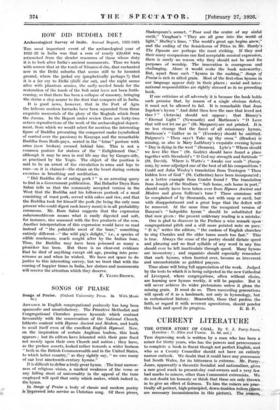SONGS OF PRAISE
ADVANCE in English congregational psahnody has long been spasmodic and unsatisfactory.. The Primitive Methodist and Congregational Churches possess hymnals which contrast favourably with the conservatism of the National Church, hitherto content with Hymns Ancient and Modern, and loath to avail itself even of the excellent English Hymnal. Now, on the inspiration of certain Anglican leaders, this book appears ; but its editors have laboured with their gaze fixed not merely upon their own Church and nation ; they have, as the preface asserts, looked rather towards a wider horizon " both in the British Commonwealth and in the United States, to which latter country," as they rightly say, " we owe many of our best nineteenth-century hymns."
It is difficult to define a truly great hymn. The least narrow- ness of religious vision, a marked weakness of the verse or any falling short of universality in the appeal of the tune employed will spoil that unity which makes, which indeed is, the hymn.
In Songs of Praise a body of classic and modern poetry is impressed into service as Christian song. Of these pieces,
Shakespeare's sonnet, " Poor soul the centre of my sinful, earth," Vaughan's " They are all gone into the world of light," Shelley's lines, " The world's great age begins anew," and the ending of the Semichorus of Pities in Mr. Hardy's The Dynasts are perhaps the most striking. If they and their many companions can find acceptable musical expression, there is surely no reason why they should not be used for purposes of worship. The innovation is courageous and challenging. Alone it would make the book noteworthy, But, apart from such . " hymns in the making," Songs of Praise is rich in sifted grain. Most of the first-class hymns in our language appear duly in their places ; social and inter- national responsibilities are rightly stressed as in no preeeding book.
If one criticizes at all adversely it is because the book holds such promise that, by reason of a single obvious defect, it must not be allowed to fail. - It is remarkable. that Jean Ingelow's hymn " And didst thou love the race that loved not thee ? " (Artavia) should not appear ; that Binney's " Eternal Light " (Newcastle) and Matheson's " 0 Love that will not let me go" (St. Margaret) are not printed. it is.. no less strange that the finest of all missionary hymns, Matheson's " Gather us in " (Eversley) should be omitted... Palgrave's " Thou says't Take ,up thy cross." (Braden) is missing, so also is Mary Lathbury's exquisite evening hymn " Day is dying in the west " (Sennen). Lyte's " Who'll should' we love like thee " (St. Godric) should have found a place together with Sternhold's " 0 God my strength and fortitude " (St. David). Where is Watts's " Awake our souls "_ (Samp- son), by some adjudged one of the best of all his compositions ? Could not John Wesley's translation from Terstegen " Thoir • hidden love of God " (St. Catherine) have been incorporated ; or a better example from Conder found ? The translation' from Joseph of the Studium " Safe home, safe home in port;" - should surely have been taken over from Hymns Ancient and - Modern and given Sullivan's tune ? These omissions will '- be complained of by thousands, not with carp or cavil, but' with disappointment and a great hope that the defect will', be removed. At the same time the recognized version of Bunyan's " hobgoblin hymn " should be substituted for' that now given : the present unliterary reading is a mistake."
One is glad to discover in the Preface a wise remark upon congregational pitch and a still more pointed note on pace.' " It is," writes the editors, " the custom of English churches to sing Chorales and the older tunes much too fast." - This is true. Always the sense of the poetry should dictate speed- and phrasing and no final syllable of any word in any line should ever be left inarticulate through speed. Many hymns are invocatory ; and organists should especially remember that such hymns, when hurried over, become as irreverent and uncomfortable as gabbled prayers.
Time alone will bring full appreciation of the work. Judged by the tests to which it is being subjected in the new Cathedral of Liverpool, where congregations, often without choirs, are learning new hymns weekly, it will be popular. But it will never achieve its wider pretensions unless it glean the • missing grain. It must do so. Then succeeding generations will speak of it as a landmark; not only in hymnology, but , in ecclesiastical history. Meanwhile, those that profess the faith, or regard it with reverent agnosticism, should ponder .
this book and speed its progress. E. B. P.






















































 Previous page
Previous page